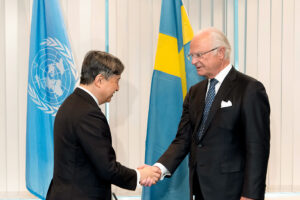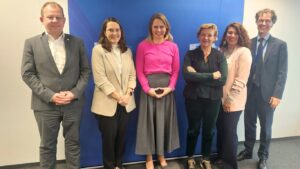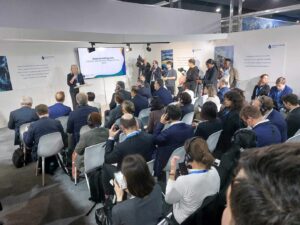Accelerating growth through water: SIWI participates in African discussions
Earlier this week, Director of SIWI’s Africa Regional Centre, Anton Earle participated in two important meetings. Both focused on accelerating the implementation of a water and sanitation Sustainable Development Goal (SDG) for G77 nations, specifically, by exploring new models for public-private cooperation.
First, he participated in a private session held in Cape Town by the World Economic Forum (WEF) in Africa, titled “Accelerating Water-Enabled Growth in G77 Countries”. Anton also attended the CEO Infrastructure Project Developers Summit for Africa convened by the International Finance Corporation (IFC).
Some 20 participants attended the WEF session, including strong representation from the private sector, and government representatives from South Africa, Namibia, Rwanda and Sweden.
It is widely agreed that there is a strong need to focus on wastewater treatment in developing countries – largely due to the rapid urbanization of G77 cities. Through its role as G77 Chair, South Africa has championed the proposal of an “Urban Water Alliance” – an innovative public-private platform for cooperation that supports “South-South” solutions to tackle urban wastewater infrastructure development across the next generation of rapidly growing G77 cities.
In additional to the proposal, the session facilitated knowledge-sharing in relation to increased sharing of recycled or reused wastewater in developing countries. Globally, less than 20 per cent of wastewater is reused or recycled. This waste of a potentially significant source of water represents a missed opportunity. Wastewater should not be viewed as a waste product but rather as a resource which can contribute to water, energy and food security, as well as a potentially lucrative business opportunity for the private sector.
The need for innovation in both the technical field, and in finance and institutional frameworks was highlighted, as was the importance of working across various sectors, and building capacity and exchanging knowledge.
The session concluded with a proposal to proceed with activities in key pilot cities in South Africa, Namibia, Kenya, and India.
At the CEO Infrastructure Summit for Africa, a Global Infrastructure Project Development Fund established by the IFC was highlighted. InfraVentures helps to develop public-private partnerships and private projects for infrastructure in developing countries. It provides early-stage risk capital and actively participates in the project development phase to create private infrastructure projects that are commercially viable and able to more rapidly achieve financing close.
Another initiative discussed at the CEO summit was the Africa50 Infrastructure Development Fund under the African Development Bank. Africa50’s critical objective is to shorten the time between project idea and financial close – from a current average of 7 years to under 3 years.
It is important for existing water infrastructure development needs to be translated into project opportunities that can attract the interest of investors. There is a strong business case for investing in water supply, water treatment and wastewater recycling infrastructure given the scarcity and critical nature of water.
We hope that the social and environmental water requirements for people to live dignified and healthy lives, and eco-systems protected, will be supported through the judicious development of sustainable water infrastructure projects across the value chain.








